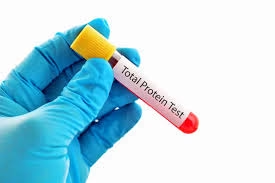
AIM: Determination of Total Protein
Introduction
- Total Proteins are the most abundant compounds in serum.
- Amino acids are the building blocks of all proteins.
- In turn, proteins are the building blocks of all cells and body tissues.
- They are the basic components of enzymes, many hormones, antibodies and clotting agents. Proteins act as transport substances for hormones, vitamins, minerals, lipids, and other compounds.
Plasma/serum proteins comprise a complex mixture of different proteins. The important total proteins in the plasma/serum are:
- Albumin
- Globulin
- Conjugated proteins such as lipoproteins
- Fibrinogen (absent from serum)
Methods for Estimating Proteins
- Nitrogen estimation by Kjeldahl technique
- Ninhydrin reaction
- Lowry’s method for estimating tyrosine estimation
- Biuret method
Biuret method.
Principle
Substances that contain two CONH2 groups joined together directly or through a single carbon or nitrogen atom, and those that contain two or more peptide links give a purple-coloured compound with an alkaline copper solution.
Reagents
- Stock biuret reagent
- Biuret solution for use
- Tartrate iodide solution
- Bovine or human albumin standard, 2 mg/ml.
Procedure
| Test | Standard | Blank | |
| Serum, ml | 0.1 | – | – |
| Albumin standard, ml | – | 3.0 | – |
| Distilled water, ml | 2.9 | – | 3.0 |
| Biuret reagent, ml | 3.0 | 3.0 | 3.0 |
Mix and incubate all the tubes at room temperature for 10 minutes. Read absorbance against reagent blank at 540 nm or green filter.
Calculation
Concentration of Total Protein in 100 ml serum (g %)
= T/S × con of std × 100/vol. of serum × 1/1000
= T/S × 5 mg × 100/0.1 × 1/1000
= T/S × 5 g%
Concentration of standard = 5 g%
= 5000 mg/ 100 ml
= 500 mg/10 ml
= 50 mg/1 ml
= 5mg/ 0.1 ml
Normal Values
- Total serum proteins – 6–8 g/dl
- Albumin – 3.7–5.3 g/dl
- Globulin – 1.8–3.6 g/dl
Clinical Significance
Total Protein Increased (Hyperproteinemia)
Mechanism: Usually due to increased globulins, less commonly due to hemoconcentration or increased production of immunoglobulins.
1. Chronic infection (including tuberculosis)
-
Persistent infections stimulate long-term immune activation.
-
Leads to increased immunoglobulin production, raising total protein levels.
-
Seen commonly in TB, chronic abscesses, and granulomatous infections.
2. Adrenal cortical hypofunction (Addison’s disease)
-
Reduced cortisol levels decrease plasma volume due to sodium loss.
-
Hemoconcentration artificially elevates total protein.
-
Chronic inflammation may also increase globulin levels.
3. Collagen vascular diseases (e.g., SLE, RA)
-
Immune system hyperactivity causes polyclonal increase in immunoglobulins.
-
Reflects ongoing autoimmune inflammation.
4. Hypersensitivity states (allergic or immune reactions)
-
Triggered by antigen–antibody responses.
-
Immunoglobulin (IgE, IgG) levels increase, raising total protein.
5. Sarcoidosis
-
A chronic granulomatous disorder with strong cell-mediated immunity.
-
Results in elevated gamma globulin levels due to chronic inflammation.
6. Dehydration
-
Reduction in plasma water volume concentrates proteins, causing a relative increase in total protein.
7. Respiratory distress
-
Severe respiratory disorders cause hypoxia-induced dehydration and hemoconcentration.
-
Chronic inflammatory activity may also elevate globulin levels.
8. Hemolysis
-
Although hemolysis does not truly raise serum protein, free hemoglobin in the sample falsely elevates total protein in colorimetric tests.
-
Clinically important to differentiate from true hyperproteinemia.
9. Cryoglobulinemia
-
Presence of abnormal immunoglobulins that precipitate in the cold.
-
Associated with hepatitis C, autoimmune diseases, and lymphoproliferative disorders.
-
Increases total protein due to high globulin fractions.
10. Alcoholism
-
Chronic alcohol use may cause** liver injury**, increasing immunoglobulin synthesis.
-
Alcoholics often develop IgA elevation, raising total protein levels.
11. Leukemia (especially multiple myeloma / plasma cell disorders)
-
Overproduction of monoclonal immunoglobulins (“M protein”).
-
Markedly increases serum total protein and gamma globulin fraction.
Total Protein Decreased (Hypoproteinemia)
Mechanism: Usually due to low albumin, and occasionally low globulins. Could result from decreased synthesis, increased loss, or dilution.
1. Malnutrition and malabsorption
-
Inadequate protein intake or impaired GI absorption reduces availability of amino acids.
-
Leads to low albumin and globulins.
-
Seen in Kwashiorkor, celiac disease, chronic pancreatitis.
2. Liver disease (acute or chronic)
-
Liver synthesizes albumin and many globulins.
-
Damage (cirrhosis, hepatitis) reduces production → low total protein.
-
Albumin falls more significantly than globulins.
3. Diarrhoea
-
Protein loss occurs through GI tract due to mucosal injury.
-
Severe diarrhea can also lead to dehydration, but persistent diarrhea causes net protein loss → hypoproteinemia.
4. Severe burns
-
Loss of plasma proteins through damaged skin.
-
Increased metabolic demand also accelerates protein catabolism.
-
Leads to profound hypoalbuminemia.
5. Hormonal imbalances that favor protein breakdown
Examples:
-
Hyperthyroidism
-
Hypercortisolism (Cushing’s syndrome)
-
Severe stress states
These conditions promote protein catabolism, reducing serum protein levels.
6. Low albumin (hypoalbuminemia)
Causes:
-
Nephrotic syndrome (protein loss through kidneys)
-
Liver failure
-
Protein-losing enteropathy
Since albumin constitutes ~60% of total protein, even mild reduction drops total protein significantly.
7. Low globulins
-
Occurs in immunodeficiencies (congenital or acquired).
-
Seen in leukemia treatment, HIV, prolonged immunosuppressive therapy.
-
Reduces total protein when globulin fraction is low.
8. Pregnancy
-
Plasma volume increases substantially (hemodilution).
-
Leads to relative decrease in total protein and albumin concentrations.
-
Not due to true protein deficiency.